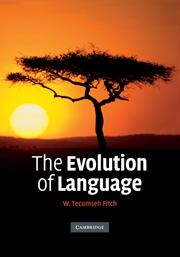Book contents
- Frontmatter
- Contents
- List of figures
- Acknowledgments
- Introduction
- SECTION 1 THE LAY OF THE LAND
- SECTION 2 MEET THE ANCESTORS
- SECTION 3 THE EVOLUTION OF SPEECH
- SECTION 4 EVALUATING PHYLOGENETIC MODELS OF LANGUAGE EVOLUTION
- 11 Historical overview: Western theories of language origin before Darwin
- 12 Lexical protolanguage
- 13 Signs before speech: gestural protolanguage theories
- 14 Musical protolanguage
- 15 Conclusions and prospects
- Glossary
- Appendix: species names
- References
- Author index
- Subject index
- Species index
15 - Conclusions and prospects
Published online by Cambridge University Press: 05 June 2012
- Frontmatter
- Contents
- List of figures
- Acknowledgments
- Introduction
- SECTION 1 THE LAY OF THE LAND
- SECTION 2 MEET THE ANCESTORS
- SECTION 3 THE EVOLUTION OF SPEECH
- SECTION 4 EVALUATING PHYLOGENETIC MODELS OF LANGUAGE EVOLUTION
- 11 Historical overview: Western theories of language origin before Darwin
- 12 Lexical protolanguage
- 13 Signs before speech: gestural protolanguage theories
- 14 Musical protolanguage
- 15 Conclusions and prospects
- Glossary
- Appendix: species names
- References
- Author index
- Subject index
- Species index
Summary
The reader, reaching these final pages, might understandably feel a sense of frustration that I have neither specified which of the many hypotheses discussed in the book I believe to be correct, nor laid out a theory of language evolution I believe to be true. Instead, I have stressed both the weaknesses and strengths of many different hypotheses, approaches, and perspectives on language evolution. The book may seem inconclusive as a result. Such a frustration is natural, and inevitable, given the goal of this book. My aim was to provide readers with the intellectual framework and empirical data to draw their own conclusions about language evolution, and further to generate their own hypotheses (perhaps quite different from any reviewed here). I have stressed the need for a research program in language evolution that sympathetically considers multiple hypotheses, in parallel, derives contrasting predictions from each, and tests these predictions empirically. Given this goal, it would be inconsistent for me to conclude by defending my own favored theory of language evolution: my argument was for an overall approach, not for any particular model.
There are enough books proffering strong opinions about language evolution, vigorously defending each of the hypotheses we have discussed (Donald, 1991; Bickerton, 1995; Calvin and Bickerton, 2000; Lieberman, 2000; Burling, 2005; Mithen, 2005). My intent here was not to add to this list, but to integrate their arguments into a larger framework.
- Type
- Chapter
- Information
- The Evolution of Language , pp. 508 - 512Publisher: Cambridge University PressPrint publication year: 2010

